Unit2 导学案
Unit 2 My family Part C Story time(导学案)人教PEP版英语三年级

Unit 2 My family Part C Story time (导学案) 人教PEP版英语三年级下册一、教学目标1.听懂、会说并正确理解以下单词和句型:father, mother, sister, brother, family tree, this is…2.能够通过简单的故事,辨认出不同的亲属关系,使同学们了解各自的家庭结构。
3.学会使用“this is…”来介绍家庭成员。
二、教学重难点1.重点:–掌握家庭成员的英文单词。
–能够根据简单的故事理解不同的亲属关系。
2.难点:–介绍家庭成员时使用合适的语言表达。
三、教学准备1.教师准备:PPT幻灯片、黑板、彩笔等。
2.学生准备:学生教材、教具等。
四、教学步骤步骤一:导入新课今天我们要学习的是Unit 2 My family Part C Story time。
这是我们学习家庭成员的第三节课,希望同学们加倍努力听课,认真学习。
步骤二:教学重点及难点请同学仔细听教师讲解本节课的重点及难点。
步骤三:教学内容1.聆听教师讲解家庭成员的英文单词,并且学生简单的了解了家族谱,知道了什么是“家谱”。
2.聆听故事《My Family》:–故事有两个,第一个是关于Alex的故事,通过故事Alex的家庭关系我们可以看出,Alex有一个姐姐,一个妈妈,一个爸爸和一个爷爷。
通过故事,我们还学会了如何使用“this is…”来介绍家庭成员。
–故事二是讲姐姐Mary和她的家庭,通过故事,我们可以学习到更多与家庭成员有关的词汇。
3.学生自己动手练习,按照家庭关系来介绍自己的家庭成员。
比如“this is…”和“My father is…”。
步骤四:教学小结在本节课中,我们学习了家庭成员的英文单词,并学会了如何介绍家庭成员。
同学们通过观看故事和自己的练习,更加深入地理解了家庭成员之间的关系。
请同学们自己回家感受一下自己的家庭关系,参照家族谱并口头描述一下自己的家庭成员情况。
英语人教新起点(一起)五年级下册-导学案-Unit 2 special days
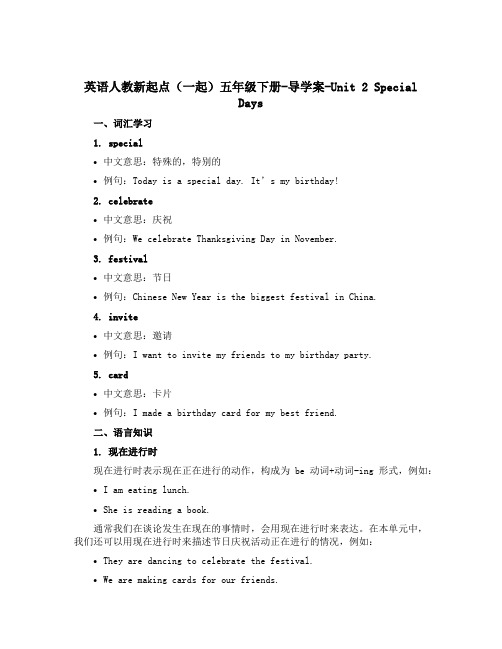
英语人教新起点(一起)五年级下册-导学案-Unit 2 SpecialDays一、词汇学习1. special•中文意思:特殊的,特别的•例句:Today is a special day. It’s my birthday!2. celebrate•中文意思:庆祝•例句:We celebrate Thanksgiving Day in November.3. festival•中文意思:节日•例句:Chinese New Year is the biggest festival in China.4. invite•中文意思:邀请•例句:I want to invite my friends to my birthday party.5. card•中文意思:卡片•例句:I made a birthday card for my best friend.二、语言知识1. 现在进行时现在进行时表示现在正在进行的动作,构成为be动词+动词-ing形式,例如:•I am eating lunch.•She is reading a book.通常我们在谈论发生在现在的事情时,会用现在进行时来表达。
在本单元中,我们还可以用现在进行时来描述节日庆祝活动正在进行的情况,例如:•They are dancing to celebrate the festival.•We are making cards for our friends.2. 邀请的表达方法在英语中,邀请别人参加某件事情时,我们可以用以下表达方式:•Would you like to…?(你想要…吗?)•Do you want to…?(你想要…吗?)•Shall we…?(我们来…吧!)•Let’s…(让我们…吧!)例如:•Would you like to come to my birthday party?•Let’s celebrate the festival together!三、课文理解1. 故事内容本单元的课文讲述了两个小朋友在一起庆祝生日的故事。
人教九年级Unit 2 优秀导学案(含答案)

Unit 2 I think that mooncakes are delicious!Section A(1a-2d)1.重点单词:mooncake,lantern,stranger,relative,pound2.重点短语:put on3.重点句式:Bill wonders whether they'll have zongzi again next year.—What do you like best about the Dragon Boat Festival?—I love the races,I think that they're fun to watch.I've put on five pounds!I wonder if it's similar to the Water Festival of the Dai people in Yunnan Province.People go on the streets to throw water at each other.You will have good luck in the new year.1.重点短语和句型2.that,if 和whether 引导的宾语从句that, if 和whether 引导的宾语从句一、预习课本P9-10新单词并背诵,完成下面的汉译英。
1.3.5.磅________二、认真预习1a-2d内容找出以下短语和句型。
1.增加________________________________________________________________________ 2.Bill 想知道明年他们是否还能吃粽子。
________________________________________________________________________ 3.—关于端午节你最喜欢什么?—我喜欢比赛,我认为他们看起来很有趣。
五年级下册英语导学案-Unit 2 Special Days Lesson 2 人教新起点版

五年级下册英语导学案-Unit 2 Special Days Lesson 2 人教新起点版一、前置知识在学习本课内容之前,需要掌握以下前置知识:1.掌握英语数字0-9的发音和书写。
2.掌握英语词汇:special day、birthday、New Year’s Day、Easter、Christmas、Halloween等。
二、学习目标本节课学习目标如下:1.了解常见的特殊日子的英语表达方式。
2.能够正确朗读和书写这些特殊日子的英语名称。
3.掌握问询特殊日子的英语问句及其回答。
三、学习内容本节课主要学习以下内容:1.特殊日子的英语表达2.问询特殊日子的英语问句和回答1. 特殊日子的英语表达在英语中,一年中的某些日子被称为特殊日子,这些日子有自己的英语名称。
下面是常见的一些特殊日子及其英语表达方式。
•生日:birthday•元旦:New Year’s Day•复活节:Easter•圣诞节:Christmas•万圣节:Halloween2. 问询特殊日子的英语问句和回答在英语中,询问别人生日或其他特殊日子的方式和中文是有些不同的。
下面给出一些常见的英语问句和回答。
•问句:“When is your birthday?”(你的生日是什么时候?)–回答:“My birthday is on June 1st.”(我的生日是6月1日。
)•问句:“When is New Year’s Day?”(元旦是什么时间?)–回答:“New Year’s Day is on January 1st.”(元旦是1月1日。
)•问句:“When is Easter?”(复活节是什么时间?)–回答:“Easter is in April.”(复活节在四月份。
)•问句:“When is Christmas?”(圣诞节是什么时间?)–回答:“Christmas is on December 25th.”(圣诞节是12月25日。
Unit 2 What time do you go to school 导学案(含答案)

❶ at作介词,无论表示时间点还是空间点,at都用于“小而具体”的名词前,比如时间表达“在几点”,地点表达“在哪儿”。
eg:at the moment此时此刻at nine o'clock在9点at noon在中午
❷ in的本意是“在……之内”,表示时间的时候,指的是在一个比较长的时间段之内,表示地点的时候,表示在地点名词内部。
【辨析】:work与job
work
不可数名词
泛指抽象意义的工作。
job
可数名词
指具体的某种工作或职业。
eg:My brother has a job(n. ). He is a worker(n. ) and works(v. ) in a factory. He likes his work(n. ) very much.我哥哥有一份工作。他是一名工人,在一家工厂工作。他非常喜欢他的工作。
7.because we have a shower schedule.
____________________________________________________________________
8.He works at a radio station.
____________________________________________________________________
5.What time do you usually take a shower, Rick?
____________________________________________________________________
二年级下册英语导学案- Unit 2 Weather Lesson 2 -人教(新起点)

二年级下册英语导学案- Unit 2 Weather Lesson 2 -人教(新起点)一、学习目标1.学习英语天气词汇和表达方式;2.发展听、说、读、写的英语能力;3.了解天气对日常生活的影响。
二、学习重点1.天气词汇的学习和掌握;2.天气表达方式的学习;3.天气对日常生活的影响。
三、学习难点1.如何正确表达天气状况;2.如何描述天气对日常生活的影响。
四、课前预习1.复习课本第一节课的重点内容;2.预览课本第二节课的内容,了解生词和重点短语。
五、课堂学习1. Warming Up:1.Greetings;2.Chant:“What’s the weather like today? It’s sunny.”2. Presentation:1.Play the video of weather forecast;2.Ask students to pay attention to the weather and take notes;3.Ask students to share their notes with partners.3. Practice:1.Pair work: Ask and answer the weather questions with a partner;2.Group work: Discuss how the weather today will affect your daily activities;3.Present their discussion to the class.4. Extension:1.Watch a video or read an article about how the weather affects people’s lives in different regions;2.Discuss the differences between these regions and your region in terms of weather.六、课堂作业1.Review the weather vocabulary learnt in this class;2.Write a short paragraph about how weather affects your daily activities;3.Preview the next lesson and prepare for the new vocabulary.七、学习评价1.学生对天气和天气表达的掌握;2.学生对天气对日常生活的影响的了解;3.学生间的讨论和交流水平。
人教版英语八年级上册 Unit 2 Section A(1a-2e)导学案 (含答案)

人教版英语八年级上册第二单元Unit 2 How often do you exercise?Section A (1a-2d)导学案一、预习目标:1、单词:学习这两页的生词。
2、短语过关:学习关于“做某事的频率”的相关短语。
3、语法:频率副词usually\ often\ sometimes \ never\ hardly ever等。
4、句子过关:How often do you exercise? 你多久锻炼一次?\ I often watch TV. 我经常看电视。
\ I never go shopping. 我从不购物。
\ I watch TV every day. 我每天看电视。
5、积累有关书面表达的句子。
预习导学。
(一)、单词突破——根据下面的提示,写出下列单词的意思。
1、housework ____________2、hardly____________3、ever____________4、hardly ever____________5、once_____________6、twice______________7、Internet_____________8、program_____________9、full________________ 10、swing_____________ 11、swing dance ________________单词讲解:1、housework家务劳动、家务事,不可数名词,常用短语do housework,表示“做家务劳动”。
2、hardly几乎不、几乎没有,表示否定。
3、ever在任何时候、从来、曾经,注意和never(绝不)相区别。
4、hardly ever几乎从不;例如:She hardly ever eats junk food. 她几乎从不吃垃圾食品。
5、once一次、曾经,表示次数;例如:once a month一个月一次。
6、twice两次、两倍,表示次数;例如:twice a year一年两次。
人教版英语八年级上册Unit2:How often do you exercise 导学案

Unit2:How often do you exercise? 导学案Unit A一、词汇、短语、句型默写(课后默写)1、家务2、几乎不3、从来、曾经4、几乎从不5、一次,曾经6、两次、两倍7、互联网8、节目9、满的、充满的10、摆动、秋千其过去式是11、摇摆舞12、或许、可能13、最小(的)、最少(的)14、至少、不少于15、多久一次16、锻炼17、帮助18、在周末19、去看电影20、看电视21、去购物22、你最喜欢的节目23、看英语书24、下个星期25、上舞蹈和钢琴课26、哪种舞蹈27、一个月一次28、打网球29、熬夜30、吃早餐31、吃一顿健康的早餐32、运动33、早点睡觉34、放学后二、课文知识讲练(一)1、how often意思是“多久一次”,用来问时间频率。
(1)always(总是)、usually(通常)、often(经常)、sometimes(有时)、seldom(很少)、hardly ever(几乎不)、never(从不)这些都是频度副词,放在助动词或情态动词后,谓语动词前面;sometimes也可以位于句首或句尾。
(2)every+时间,once a week (一星期一次),twice a month (一个月两次),three times a year (一年三次)、four times a month (一个月四次)等这些都是表示时间频率,一般放在句尾。
2、how long 意思是“多久、多长”,用来问物体长度或时间的长短。
3、how soon意思是“多久”,用来问“in+一段时间”这种将来的时间结构。
4、how far意思是“多远”,用来问路程,距离。
5、how many 意思是“多少”,问可数名词的数量。
(1)will your father come back ? In two days .(2)do you do exercise ? Every day .(3)did it take you to get there ? About half an hour .(4)is it from here to your home ? About two kilometers .(5)is it from? Ten minutes’ walk .(6)do you run every week ? Three times .(7)do you run ? Three times a week .(二)、exercise :1、意思是“锻炼”,是动词和不可数名词,do exercise “锻炼”。
Module3 Unit2导学案2023-2024学年外研版英语八年级上册含答案

Module3 Unit2导学案2023-2024学年外研版英语八年级上册(含答案)Unit 2: This year we are training more carefully.导学案【学习目标】1,掌握本课单词,词组和重点句型。
2,掌握多音节形容词和副词的比较级。
【课前自主预习】单词闯关1,打败;战胜_________ 2,粗心的;疏忽的________ 3,教练________ 4,(体育)训练;操练v._________ 5,通常的;平常的adj._________ 6,更好的________ 7,开心的;满足的________ 8,响亮地,大声地adv.__________ 9,自信的____________ 10,(在比赛或战斗中)对(某人或某事物)_________短语互译1,cheer······on _______________ 7,热身,做准备活动__________ 2,What a pity!______________ 8,与······对抗________________ 3, have a ·····chance of___________ 9,迟到___________ 4,not·····but__________ 10,课外___________ 5,打败某人__________ 11,赢得比赛______________ 6,输给某人或某队_____________句型在线1,We all arrive_____ _________ _______ we can _____ _______ we have time to warm up. 我们都尽可能的早到,以便我们有时间热身。
UNIT2LOOKINTOTHEFUTUREReadingAndThinking(导学案)高二英语系
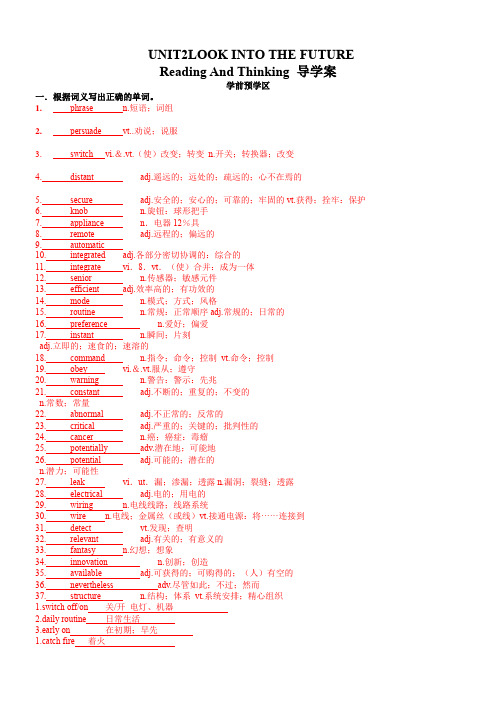
UNIT2LOOK INTO THE FUTUREReading And Thinking 导学案学前预学区一.根据词义写出正确的单词。
1.phrase n.短语;词组2.persuade vt..劝说;说服3.switch vi.&.vt.(使)改变;转变n.开关;转换器;改变4.distant adj.遥远的;远处的;疏远的;心不在焉的5.secure adj.安全的;安心的;可靠的;牢固的vt.获得;拴牢:保护6.knob n.旋钮:球形把手7.appliance n.电器12%具8.remote adj.远程的;偏远的9.automatic10.integrated adj.各部分密切协调的:综合的11.integrate vi.8.vt.(使)合并:成为一体12.senior n.传感器;敏感元件13.efficient adj.效率高的;有功效的14.mode n.模式;方式;风格15.routine n.常规:正常顺序adj.常规的;日常的16.preference n.爱好;偏爱17.instant n.瞬间;片刻adj.立即的;速食的;速溶的mand n.指令;命令;控制vt.命令;控制19.obey vi.&.vt.服从;遵守20.warning n.警告:警示:先兆21.constant adj.不断的;重复的;不变的n.常数;常量22.abnormal adj.不正常的;反常的23.critical adj.严重的;关键的;批判性的24.cancer n.癌;癌症:毒瘤25.potentially adv.潜在地;可能地26.potential adj.可能的;潜在的n.潜力;可能性27.leak vi.ut.漏;渗漏;透露n.漏洞;裂缝;透露28.electrical adj.电的;用电的29.wiring n.电线线路;线路系统30.wire n.电线;金属丝(或线)vt.接通电源:将······连接到31.detect vt.发现;查明32.relevant adj.有关的;有意义的33.fantasy n.幻想;想象34.innovation n.创新;创造35.available adj.可获得的;可购得的;(人)有空的36.nevertheless adv.尽管如此;不过;然而37.structure n.结构;体系vt.系统安排;精心组织1.switch off/on关/开电灯、机器2.daily routine日常生活3.early on在初期;早先1.catch fire着火5. in this sense在这种意义上来说6.remote control遥控器;遥控7.air conditioner 空调;空调设8in addition另外;此外e on开始运转;加把劲;出场10.prevent ...from阻止...预防...二.单词拼写1.Be wise Don't let yourself be persuaded(说服)into buying anything you don't need even nt n low price,2.When you leave the room, please turn off all the switches(开关),3.In the past,studying abroad was n distant(遥远的)dream for most people.4.New technology should provide n secure(可靠的)firewall against hackers,5,Breathing in an automatic(自动的)function of the body.6.The man was badly wounded and needed an instant(立即的)treatment,7. Take a few days out of your week for at least half an hour of activity,and try to stick to a routine(常规).8.The commission intervened and commanded(命令)that work on the building cease.9. It was the first time that mankind had used an instrument 10detect(发现;查明)an earthquake.10. There are plenty of jobs available(可获得的)in the western part of the country.课中导学区Learning objectives1.获取与梳理出未来智能家居的功能。
Unit2第2课时(SectionA2d3c)(导学案)八年级英语上册(人教版)
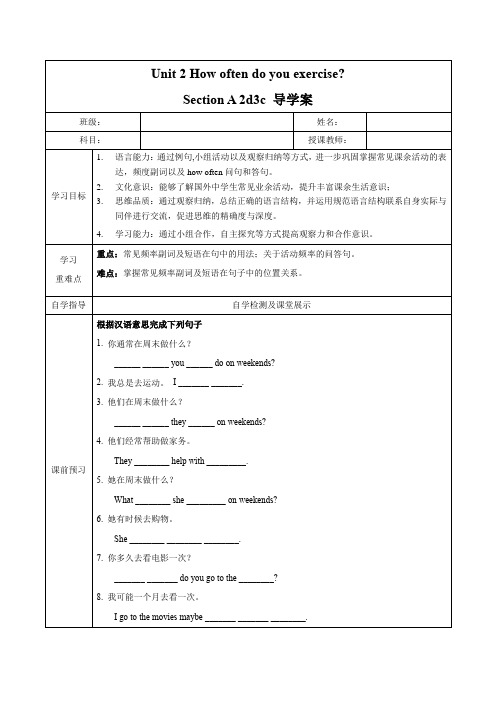
Watch a video—What kind of dance is it?1. Clair and Jack are talking about weekend activities. Listen and match.2. Listen and read 2d quickly and answer the questions.1). Is Claire free next week? Why?2). What kind of dance is Claire learning?3). How often does Claire have dance lessons? How about her piano lessons?4). What does Claire invite Jack to do? When can Jack join Claire for the activity?3. retell the conversation.Claire is not next week. it is quite for her. She has and lessons. And she has swing dance every Monday, it’s . How often does she have piano lessons? , on Wednesday and Friday. Tuesday? She has play tennis with her friends.4. role play the conversation.1.频率副词在句子中的位置:2.频率短语练习1.Finish 3a. Complete the questions with do or does. Then match the questions and answers.2. Finish 3buse the words given to write questions.Then ask and answer them with a partner.3. Make a conversation with your partner.1. How often do you do these activities? Fill in the chart and then make conversations.2. Make a conversation with your group member.一、单项选择。
Module 1 Unit 2 导学案

Unit 2I feel nervous when I speak Chinese.课型:读写课◎知识导航请预习下列重点单词、短语和句子,并完成下面的表格及相关训练(标•的为重点单词拓展内容)。
单词和短语重点单词名词1.[用复数]眼镜glasses•(短语)一副眼镜a pair of glasses2.[用复数]牛仔裤jeans•(短语)一条牛仔裤a pair of jeans3.陌生人stranger•(adj.)陌生的;奇怪的strange4.电子邮件;口信;信息message•(近义词)电子信件email5.业余爱好hobby•(近义词) 兴趣interest6.分数mark•(近义词)得分score成绩grade7.(用于信尾)爱你的……love•(v.)喜欢;热爱love形容词8.情绪不安的;紧张的nervous•(反义词)放松的relaxed9.(头发)金色的,浅褐色的fair10.秀丽的;标致的pretty•(adv.)相当地•(近义词)美丽的;漂亮的beautiful11.感到自豪的;感到骄傲的proud•为……而感到骄傲be proud of介词12.参加;加入;在……期间;用,按照,以(某方式或风格) in•(短语)在寒假期间in winter holiday•(短语)用这种方式in this way重点短语1.因……而感谢thanks for ...2.收到某人的来信hear from sb.3.某人等不及了sb. can't wait4.从……认出某人know sb.from …5.看起来很美look pretty6.彼此each other7.告诉某人某事tell sb. about sth.8.在学校;上学at school9.花费……做某事spend ...doing sth.10.也as well11.擅长be good at12.得低分get bad marks13.首先,起初at first14.几天之后in a few days15.感到紧张feel nervous16.用正确的方式in the right way17.害怕……be afraid of ...18.对……兴奋be excited about ...学以致用根据语境或提示,完成填空。
高一英语必修第一册(2019版)_Unit2_Reading_for_writing_导学案
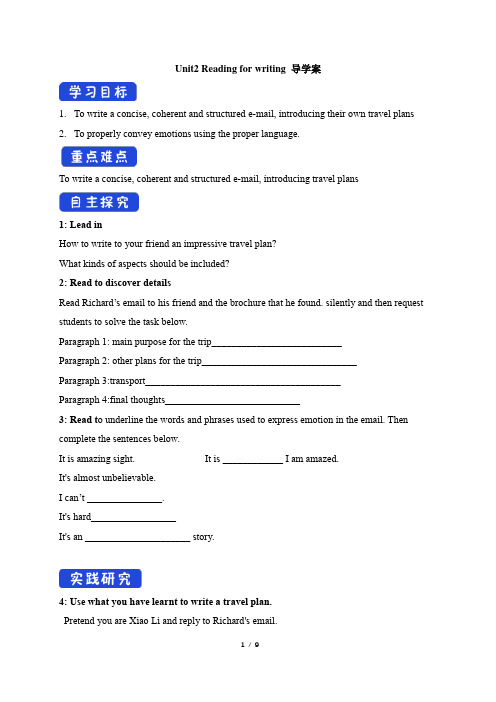
Unit2 Reading for writing 导学案1.To write a concise, coherent and structured e-mail, introducing their own travel plans2.To properly convey emotions using the proper language.To write a concise, coherent and structured e-mail, introducing travel plans1: Lead inHow to write to your friend an impressive travel plan?What kinds of aspects should be included?2: Read to discover detailsRead Richard’s email to his friend and the brochure that he found. silently and then request students to solve the task below.Paragraph 1: main purpose for the trip__________________________Paragraph 2: other plans for the trip_______________________________Paragraph 3:transport_______________________________________Paragraph 4:final thoughts___________________________3: Read t o underline the words and phrases used to express emotion in the email. Then complete the sentences below.It is amazing sight. It is ____________ I am amazed.It's almost unbelievable.I can’t _______________.It's hard_________________It's an _____________________ story.4: Use what you have learnt to write a travel plan.Pretend you are Xiao Li and reply to Richard's email.___________________________________________________________________________ ___________________________________________________________________________ _________________________________________________________________________________________________ ___________________________________________________________________________ _________________________________________________________________________________________________ ___________________________________________________________________________ _________________________________________________________________________________________________ ___________________________________________________________________________ ______________________话题单词1.n.旅行2.n.日程;时刻表3.n.风景4.n.交通5.n.拥挤6.v.包装7.v.服从8.v.预订9.v.登上(船、飞机等)10.v.行为11.v.介意12.adj.严重的13.adj.拥挤的14.adj.方便的二、话题短语1.如果必要的话2.记住……3.越来越多的4.送行5.引起,导致6.减少7..留某人住宿8.(在)度假9..与某人道别10.收拾行李11.名胜12....被……迷住13.旅行顺利14.阻塞15.旅游景点16.接近大自然17.安排住宿18.开拓视野三、增分句式1._______________having a travel agency arrange our accommodation,we booked the train tickets and hotel rooms on the Internet by ourselves.不是让旅行社安排我们的住宿,我们自己在网上订了车票和宾馆。
五年级下册英语导学案-Unit 2 Special Days Lesson 2 人教(新起点)

五年级下册英语导学案-Unit 2 Special Days Lesson 2 人教(新起点)一、教学目标1.能够听懂并掌握单词生日、cake、candle、present。
2.能够在语言环境中灵活运用所学单词。
3.能够简单描述生日派对的相关场景和活动。
二、教学重点1.生日、cake、candle、present等生日派对的相关单词。
2.能够简单描述生日派对的相关场景和活动。
三、教学难点1.生日派对的相关场景和活动的简单描述。
2.单词candle的发音及其用法。
四、教学准备1.课件及相关教学辅助工具。
2.生日蛋糕、蜡烛、礼物等生日派对场景道具。
五、教学过程(一)Warm-up1.师生互动问候,营造良好的学习氛围。
2.通过图片、小视频等教具呈现生日派对场景,激发学生的学习兴趣。
(二)Presentation1.师生共同探讨并学习单词birthday, cake, candle和present。
2.播放音频,让学生听懂这些单词的正确发音。
3.通过图片等教具展示生日派对场景,让学生联想和巩固生日派对相关单词。
(三)Practice1.通过对话、连线、填空等形式进行单词巩固练习。
2.通过小组活动,让学生在生日派对场景中进行交流和实践,充分巩固所学单词和语言知识。
(四)Production1.鼓励学生使用生日派对相关语言进行实践。
2.安排小组或个人进行生日派对场景表演或角色扮演,培养学生语言运用能力。
(五)Summary1.整理生日派对场景相关语言知识。
2.帮助学生加深对所学内容的理解和记忆。
(六)Homework1.完成生日派对相关单词的复习和巩固。
2.提前准备生日派对场景相关道具等。
六、教学评估1.通过教学小组或个人表现,对语言运用的流利程度进行评估。
2.通过作业和课堂练习,对学生对所学知识的掌握程度进行评估。
七、板书设计Unit 2 Special Days Lesson 2生日派对相关单词:- birthday- cake- candle- present生日派对场景描述:- I have a birthday party.- I blow out the candles.- I make a wish.- I eat cake.- I get presents.八、教学反思通过本次教学活动,学生们对生日派对相关单词和场景有了更深入的认识和理解,同时也提高了他们的英语语言运用能力。
人教英语必修1 Unit 2 导学案(全单元)
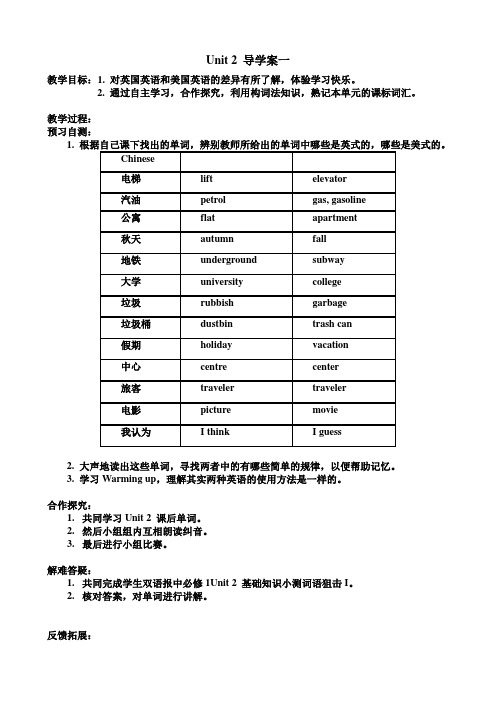
Unit 2 导学案一教学目标:1. 对英国英语和美国英语的差异有所了解,体验学习快乐。
2. 通过自主学习,合作探究,利用构词法知识,熟记本单元的课标词汇。
教学过程:预习自测:1.2. 大声地读出这些单词,寻找两者中的有哪些简单的规律,以便帮助记忆。
3. 学习Warming up,理解其实两种英语的使用方法是一样的。
合作探究:1.共同学习Unit 2 课后单词。
2.然后小组组内互相朗读纠音。
3.最后进行小组比赛。
解难答疑:1.共同完成学生双语报中必修1Unit 2 基础知识小测词语狙击I。
2.核对答案,对单词进行讲解。
反馈拓展:1.共同完成学生双语报中必修1Unit 2 基础知识小测词语狙击II。
2.核对答案,对单词词形、词意进行拓展。
课后作业:从本单元单词中挑选10以上编一个小短文。
教学反思:________________________________________________________________________________ ________________________________________________________________________________ ________________________________________________________________________________Unit 2 导学案二教学目标:1.掌握本学案中所提及的重点单词(4个)、短语(2个)、词语辨析(2组)句型结构(3个)的用法。
2. 通过练习,进一步巩固所学单词、短语在语境中的运用。
教学过程:预习自测:1.请大声朗读下面的词汇elevator petrol official native apartment actually gradualvocabulary spelling latter identity fluent frequent commandrequest expression African eastern recognize lorry voyagebase accent lighting straight block usagebecause of come up at present make use of such as play a part in请同学们用红笔标出自己在发音中存在困难的单词。
- 1、下载文档前请自行甄别文档内容的完整性,平台不提供额外的编辑、内容补充、找答案等附加服务。
- 2、"仅部分预览"的文档,不可在线预览部分如存在完整性等问题,可反馈申请退款(可完整预览的文档不适用该条件!)。
- 3、如文档侵犯您的权益,请联系客服反馈,我们会尽快为您处理(人工客服工作时间:9:00-18:30)。
Unit 2 What should I do?导学案第一课时Section A (1a-2c)【学习目标】1.牢记loud, argue等重点词汇和表示建议的句型,能谈论遇到的问题并相互提出建议。
2.通过听力练习和小组合作,学会听取特定信息、合作解决问题。
3.互相关心,友爱互助;以极度的热情投入到学习当中,做课堂的主人。
重点:重要词汇、句型和用法的掌握。
难点:灵活运用句型提建议。
【预习】(教师寄语:Custom makes all things easy.有个好习惯,事事皆不难。
)【预习导航】:1.根据音标拼读单词并牢记,完成“词汇精粹”部分。
2.阅读学案中“语法聚焦”部分,完成相关题目。
【预习导学】(10分钟)一、词汇精粹从课本1a-2c中找出下列单词、短语。
1.播放________2.争吵;争论__________3.keep out____________4.错误的__________5.style___________6.票;入场劵_________7.使惊奇________ ___8.could___________9.out of style________ 10.call sb. up________ 11.用电话交谈_________________二、语法聚焦翻译下列句子1.“What’s wrong?” “My clothes are out of style.”_______________________________2、“What should I do?”“You should say you’re sorry.” __________________________3. “What should he do?”“Maybe he should write her a letter.”____________________看一看找出例句1的问句的同义句.______________________________________________以上句子是用哪个单词提建议的,哪个副词使建议的语气更加委婉?____________ 将例句2的答语变为否定句___________________________________________【课堂练习】:用词的正确形式填空1)What should he ________________(do)?2) He could ____________(write)her a letter.3) I ____________(pay) $60 for the shoes.4)The result is _____________(surprise).5)Can you tell me how____________(surf)the Internet?【当堂测试】单项选择题()1. To her _____,Wendy is her twin sister. That’s why they look the same.A. surprisesB. surprisedC. surprisingD. surprise()2.—What’s wrong with Jack?—He needs money to buy a ticket________ Lady Gaga’s concert.A、toB、atC、inD、with()3.—Peter is ______to buy a car, but why doesn’t he buy one?—Because he needs _____on his bike.A、enough poor; enough exerciseB、poor enough; exercise enoughC、rich enough; enough exerciseD、enough rich; enough exercise()4.My mother always tells me______ my classmates at school.A、to argue withB、don’t argue withC、not argue withD、not to argue with()5.—Eve and Eric like to talk ____the phone.—So they do, They often phone each other on Sunday nights.A. toB. withC. onD. at()6.It’s very cold outside. You’d better put on your coat to _____the wind.A. keep outB. take inC. ask forD. talk about()7. “If your father comes back, please ask him to_____.”“OK!”A. call up meB. call me upC. call up youD. call you up()8.You ____eat the soup if you don’t like it.A. should n’tB. mustn’tC. needn’tD. can’t【本节脉络】:(教师寄语:Tomorrow comes never )1、本课所学短语4个:keep out 不让……进入;阻止……入内out of style不时髦的;过时的call sb. up 打电话给……on the phone 用电话交谈;在通话2、enough的用法:enough作形容词修饰名词常放在名词之前,作副词修饰形容词或副词时放在其后。
3、情态动词could和should的用法。
第二课时Section A (3a-4)【学习目标】1.扎实掌握either, pay for等单词、短语,并能灵活运用could/should句型提出建议。
2.通过小组合作探究与表演,学会总结归纳与在情景中综合运用所学。
3.体谅父母,学着自食其力。
高度专注与投入,享受学习过程的快乐。
重点:基础知识的掌握与对话的理解。
难点:灵活使用知识点表达建议。
【预习】(教师寄语: Practice makes perfect)【预习导航】:先通读3a和4中的对话,完成阅读题目,再勾画出文中的重点短语、句子,最后完成预习导学。
【预习导学】一、认真阅读3a对话和4中的对话。
找出下列单词、短语、重点句型和交际用语并勾画在课本上。
(10分钟)(一)翻译下列单词和短语1.either_________2.家庭教师________3.烘;烤_________4.付……账;付买……的钱_______5.兼职工作_________ ___6.Teen Talk___ _____7.从……借……___ ______8.向你的父母要钱__________9.为……买……__________10.join a club__________(二)句型1.I need to get some money to pay for summer camp. ____________________________2.我有一个主意。
_____________________________3.不,他也没有钱。
_________________________________________________________4. 我认为你应当向你的父母要钱。
___________________________________________5.或许你可以进行一次烤饼义卖。
___________________________________________-【课堂练习】:单项选择()1.I don't have any money and he doesn't,__________.A.too B.either C.also D.neither ()2. I need to get some money to _____the summer camp .A . pay on B. pay in C. pay with D. pay for()3.You can_____________ this book for a week.A.borrow B.lend C.keep D.buy ( )4. The child isn’t _________ to dress himself.A. big enoughB. enough bigC. old enough D enough old()5.I need some money to buy clothes__________ my mother.Her clothes are out of style.A.after B.to C.of D.for ()6.If you want to talk to your teacher ,you should _______first.A. called to herB. called up herC. call her upD. called her up()7.My friend has the same haircut I do.A.as B.like C.with D.than【当堂测试】1. I bought her a dress.(改为同义句)__________________________________________2. How much money did the ticket_____? A. pay B. cost C. spend D. take3.Nancy paid $3_____ this chocolate. A. on B. in C. of D. for4.Carol needs____________________ job.(做兼职)5.Either you or I ______ (be) going to the meeting next week.【本节脉络】:1.本节课重点单词:2.重点短语:3.句型:4. 3a 短文第三课时SectionB (1a-2c)【学习目标】1.掌握original等重点单词、短语,学会运用重点句子解决生活中的问题。
2.通过听读对话把握大意与细节信息,并通过小组合作探究解决疑难。
3.学会借助委婉的表达向他人提出意见或建议。
关注问题本身,挑战自我,争做No.1!重点:重点词汇、句子的掌握。
